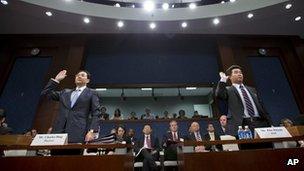Huawei and ZTE deny US spying charges at hearing
- Published

Senior officials from the two firms have been questioned by the US lawmakers
Chinese telecom firms Huawei and ZTE have denied US charges that some of their equipment has been installed with codes to help spying.
They have been accused of using these codes to relay sensitive information back to China.
Concerns over their association with the Chinese government and military have hurt the firms' expansion plans in the US.
The two are among the world's biggest makers of telecom networking equipment.
"Huawei has not and will not jeopardise our global commercial success nor the integrity of our customers' networks for any third party, government or otherwise," Charles Ding, senior vice-president of Huawei, said during a hearing in front of US lawmakers.
'Backdoors'
A committee of US lawmakers questioned senior executives from the two firms as part on a continuing investigation into their operations.
The committee's chairman, Mike Rogers, said there had been concerns about the role played by the two firms in alleged espionage.
"We have heard reports about back doors or unexplained beaconing from the equipment sold by both companies," he said.
Beaconing is a process that allows networks to self-repair network problems.
However, Zhu Jinyun of ZTE denied these charges, saying there was nothing sinister in the way the firm's equipment functioned.
"What they have been calling back doors are actually software bugs," he said, adding that such glitches were a common occurrence in the sector.
Meanwhile, both firms agreed to supply a list of their company's Communist Party committee members, something the panel said they had previously declined to do.
- Published12 September 2012
- Published13 July 2012
- Published25 May 2012